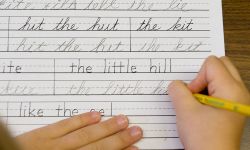After another school shooting, Michigan students, teachers worry about safety

Junior Lydia Fraser spends her days at Westwood High School keeping a suspicious eye on students with backpacks in the hallways. Junior Nick Chenault and his friends at East Lansing High School have escape routes from each room in the school. And Dean Compton, an eighth grade teacher in Grand Rapids, is running out of things to say to his students after yet another mass school shooting.
“I … never know what to say when these things happen,” Compton said. “I just apologize.”
The massacre at a Texas elementary school on May 24 was a grim reminder to Michigan students and teachers who spoke with Bridge Michigan that their personal safety is in jeopardy every day when they go to class.
Related:
- Republicans: More guns — not more laws — will keep Michigan schools safe
- University of Michigan gun violence researchers hope to curb shooting deaths
- Michigan hasn’t passed bills to make schools safer, even after Oxford shooting
- Michigan school, health leaders push for more school mental health spending
- Oxford High School tests AI gun detection system in wake of shooting
Many said their worry about school shootings was heightened after the shooting that killed four students at Oxford High School six months ago, and last week’s tragedy brought the feelings of grief, anxiety and helplessness back to mind again.
The worry of safety has become an everyday issue for students and teachers as the news of school shootings and the lockdown drills to prevent them have become more prevalent in their lives.
Anxiety-filled school days
After four students the same age as her were killed at Oxford High School, Fraser said her anxiety skyrocketed every time she stepped foot into her school.
The 11th-grader at Westwood High School, near Marquette in the Upper Peninsula, said she was fidgety and felt anxious at school. She was suspicious of her classmates in the halls and when reading their social media posts in preparation for if the “worst-case scenario” happened at her school after Oxford.
Her fears became reality in April after a student at the district’s k-8 school, Aspen Ridge, died by suicide in the bathroom using a handgun. Westwood High School and the rest of the schools in the N.I.C.E. School District were put on immediate lockdown and Fraser and her fellow students were not initially told why.
“I describe it as a feeling I never want to feel again, because me and the people around me were texting our loved ones saying ‘we're in a lockdown. We don't know what's happening. If anything happens we love you’ just because we were expecting the worst case scenario,” Fraser said.
“You can practice lockdowns as many times as you want but you can never practice the emotions that you feel during that lockdown.”
High school administrators told the students 20 minutes into the lockdown that the incident happened at Aspen Ridge, not the high school. During those 20 minutes, Fraser was hiding under the seats in the school’s auditorium texting her mom and brother updates and possible goodbyes. Fraser said classmates were still trying to reach family members in a panic until they found out the details of what happened at Aspen Ridge.
“I know it's some place I should feel safe, but I've noticed my anxiety increasing,” she said. “And for me when my anxiety increases, my depression kind of increases with it. So I have had more rough days than I've had in the past just since Oxford and (since the lockdown and suicide) at my school.”
In the month that’s passed since the Aspen Ridge incident, Fraser said she’s noticed a shift in tone from her fellow classmates on their own safety and some students even switched to online courses being offered.
“I have noticed some students left the school and went online for a while and that was the big thing,” Fraser said. “The conversations have been more of, 'I don't feel safe', but we feel like there's really not a whole lot we can do because we still need to come to school to get our education.”
Chenault, an 11th-grader at East Lansing High School, said the days at school following the Oxford shooting were ‘nerve-racking’ for him. He started checking over his shoulder constantly and keeping tabs on classmates he thought were suspicious. He said it forced him and his friends to seriously consider what to do if a shooting happened at their school.
“We definitely always talk about that,” Chenault said. “There's always like a different way to get out or how to escape to the closest exit.”
Chenault described lockdown drills as “heart-stopping” exercises, but overall feels safe again when he is at school. He said the school’s tight-knit atmosphere coupled with what he views as the administration’s commitment to investigate any threat, big or small, has personally restored his comfort.
“We've had one kid say he was going to do something, and posted it on a Snapchat story,” Chenault said. “Students right away took it straight to the administration.”
The student was removed from school and extra police were added to the campus.
“They handled it great so nothing ever happened,” he said
Weary teachers
Rick Joseph, a fifth- and sixth-grade teacher in the Birmingham Public Schools in Oakland County, said it's been apparent that his students have more angst this year. He attributed the change to multiple factors, not just the attack at nearby Oxford.
“It's all kind of a perfect storm, if you will, of the challenges of teaching and learning in the midst of a pandemic,” Joseph said. “And then an uptick in overall societal violence, shootings and certainly mass shootings that of course involve schools.
“I would say that, in general, the social and emotional development of students has been arrested.”
In Grand Rapids, sixth-grade teacher Emily Holt has noticed the same thing from her students and attributes it to the rising violence they see in their everyday lives and on social media.
“The part that bothers me is I think that our students, at least the ones that I teach, are so desensitized to violence,” Holt said.
Gun violence has been the leading cause of deaths for children ages 0-19 in Michigan since 2014, according to Everytown for Gun Safety, and more children are being exposed to violence through social media which could have a desensitizing effect to its impact, experts say.
In 2020, the Centers for Disease Control and Prevention (CDC) reported that there were 45,222 deaths in the U.S. from firearms.
School shootings have forced teachers to have uncomfortable conversations with their students about plans to react to an active shooter.
Joseph, the Birmingham teacher, said teachers and administrators have the responsibility of ensuring that a school’s safety plan is being implemented properly and to provide emotional support for students on top of their expectations as an educator.
“I believe that we are all working as hard as we possibly can to create systems that promote school safety, and of course, doing our best to provide for the social and emotional health of the students that we serve,” Joseph said. “That being said, there's no secret that we have a shortage of school counselors, psychologists and social workers at every level, and that schools in Michigan need more mental health professionals in schools on a daily basis.”
Grand Rapids teacher Compton agreed, citing the lack of support for students in his own district.
“We are stretched way too thin,” Compton said. “I know in my building, there are about 450 students. I think we have one psychologist, one counselor, two advocates which are kind of like social workers, and that is nowhere near sufficient.”
No easy solution
In the six months since the Oxford shooting, there has been no major legislation passed in Michigan to address concerns over school safety. A taskforce has been formed to investigate solutions. For now, schools are going through the same protocols with a newfound, heightened sense of responsibility.
“Now that we're six months out from Oxford, the fact that we don't have even one piece of concrete legislation is evil,” Joseph said. “It's evil.”
Teachers and students who spoke to Bridge Michigan agree that change needs to occur to make schools a place where people feel safe again. They are hopeful change will happen but are currently stuck asking when and if it will happen before an incident happens at their school.
Which path to take to return to a safe school environment, though, is harder to agree upon. Some teachers, like Joseph and Compton, want the state to increase mental health funding in schools and require more in-depth background checks for gun purchases. Holt wants more money to bolster school infrastructure as well as overhauled instruction for teachers during active shooter scenarios.
“As an educational system, we do not prioritize, in the way that we should, helping children from a mental standpoint, helping them process grief, helping them process trauma,” Compton said. “I often tell people, if I could make one decision, I would triple, quadruple the number of adults to just come alongside and help kids in school buildings.
“That’s what they're gonna have to weigh here – the lives of our kids or the cost of a steel door,” Holt said.
For students, solutions are less black-and-white. Fraser said she doesn’t know what could change to make her feel safe again. Though Fraser’s district has taken steps to protect students, from banning backpacks in hallways to an increased police presence on campus, she says she can’t shake the uneasy feeling she gets each day at school.
“You could have as much security at school or more security than what you need at a school, but I'll still feel unsafe just because of past experiences and what I've gone through,” Fraser said. “I feel like there can never be enough, especially if you have students with some sort of PTSD from previous events.”
Michigan Education Watch
Michigan Education Watch is made possible by generous financial support from:
Subscribe to Michigan Education Watch
See what new members are saying about why they donated to Bridge Michigan:
- “In order for this information to be accurate and unbiased it must be underwritten by its readers, not by special interests.” - Larry S.
- “Not many other media sources report on the topics Bridge does.” - Susan B.
- “Your journalism is outstanding and rare these days.” - Mark S.
If you want to ensure the future of nonpartisan, nonprofit Michigan journalism, please become a member today. You, too, will be asked why you donated and maybe we'll feature your quote next time!






